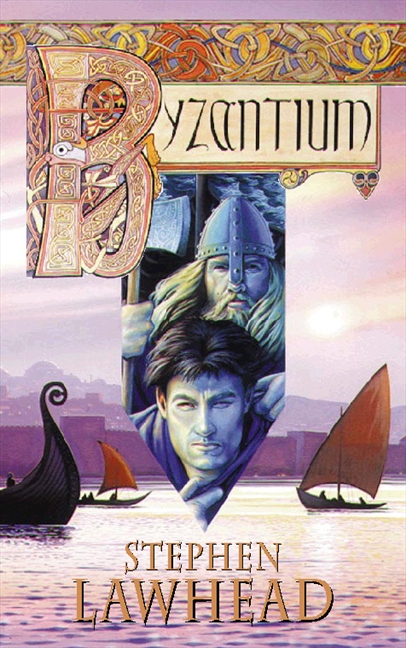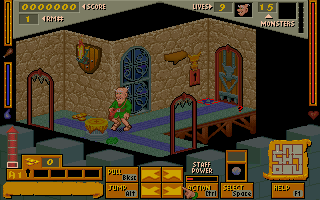 Byzantium was my favourite book in the world for a while. It’s a dense and well-researched epic about 10th century monk Aidan, and his journey to deliver the Book of Kells to the emperor of Constantinople. Every other historical thriller seems fake next to it. I don’t like slash and hack Conan the Barbarian stories starring historical people (Conn Iggulden, etc.). Byzantium feels more authentic and real. Not that I’d know whether it actually is, of course, but if it’s a deception then it was good enough to fool me, and maybe it will be good enough to fool you.
Byzantium was my favourite book in the world for a while. It’s a dense and well-researched epic about 10th century monk Aidan, and his journey to deliver the Book of Kells to the emperor of Constantinople. Every other historical thriller seems fake next to it. I don’t like slash and hack Conan the Barbarian stories starring historical people (Conn Iggulden, etc.). Byzantium feels more authentic and real. Not that I’d know whether it actually is, of course, but if it’s a deception then it was good enough to fool me, and maybe it will be good enough to fool you.
Byzantium has a putative main character, but a lot of the focus is spent on the setting and world, with the characters sometimes only wending a barely noticeable passage through it. Several worlds, in this case. Aidan journey takes him from Scandinavia to the Bosphorus to the Middle-East, to rags to riches to ruin.
Aidan is unworldly, but he has courage and faith. Plenty of the latter, in fact. Byzantium is the tale of a man facing the perils of the world with a cross around his neck. In a sense, the main character isn’t Aidan but Aidan’s faith. His candle against the dark.
Main characters don’t always survive.
Byzantium is gripping from beginning to end, but the real paydirt is its scenes of spiritual desolation and internal misery. As disaster piles on disaster, Aidan feels a wrenching abandonment from his god and savior. Few books manage to describe a crisis of faith this well. Aidan’s ideals are no match for the reality of the world he lives in, and eventually all he has is a doxastic cynicism. Wolves sometimes hide in the sacristy. Every hope can be a false one, even the hope of death. And when man makes a plan, God laughs.
I should advise that this is a slow book. There’s lots of GRRM-esque scenes of courtly intrigue, and lots of scenes with the purpose of elaborating small details in the, well, Byzantine plot. Some of them might bore at first, but if you re-read the book, these quieter scenes are the ones you’ll find most fascinating. There are a couple of rousing battles, but Lawhead comes from the “less is more” school. If you want characters who fight bandits every couple of pages like a D&D game, Conn Iggulden and David Gemmell might be more for you.
Byzantium is great, but it falls short of perfect. Fourteen years later, I notice Persian flaws that I didn’t see before. Lawhead gives Aidan a love interest, realises he has nothing for her to do, and writes her out of the story. The pacing is uneven: with the big final showdown having Lawhead racing around like a shop clerk five minutes before closing time.
Nevertheless, Byzantium is truly special. Lawhead has revisited this basic story a couple of times (Patrick, The Iron Lance), but the first blade from the mould cuts the deepest. Definitely the first thing to check out by this author, although The Song of Albion isn’t far behind.
 In the early 90s, Apogee had a nice little market. They’d take a popular console game, hack together a PC clone, and distribute it via the then-popular “shareware” model (episode 1 on the house, episodes 2 and 3 available through BBS and mail order). They made simple games that were FUN, something not every game remembers these days between their 200 page design documents and procedurally generated worlds and Hollywood voice talent.
In the early 90s, Apogee had a nice little market. They’d take a popular console game, hack together a PC clone, and distribute it via the then-popular “shareware” model (episode 1 on the house, episodes 2 and 3 available through BBS and mail order). They made simple games that were FUN, something not every game remembers these days between their 200 page design documents and procedurally generated worlds and Hollywood voice talent.
Now and then, though, they released titles that were a bit different. Take Mystic Towers…how would you sell this game?
Most Apogee titles are child friendly. This game has portraits on the walls of naked pin-up girls, and you play an elderly man who scratches his balls from time to time. It’s not an adult game, like Leisure Suit Larry, but you can hear the whisper of an envelope being pushed.
Additionally, the game is not terribly fussed about sticking to a style and at various moments plays like an RPG, a dungeon crawler, a shooting game, a puzzle game, and a platform game. Combining RPG and action gaming became a pretty trendy thing when that say-Devil-in-Spanish game came out but Mystic Towers is a bit different, more redolent of a real pen and paper RPG rather than a stat-grinding action game.
You must enter a series of towers, destroy all the monsters, destroy the monster generator that is spawning the monsters, and find the large red tower key that allows you to leave. You have lots of abilities at your disposal. Your wizard can drag boxes around to make a stack and reach high-up places, use powerups to fly or become invisible, and collect coins with which he can buy weapons. It’s all pretty simple, there’s no stats or classes. Beating the game requires exploration, patience, and a Rain Man-esque ability to memorize floor layouts.
Graphics are impressive by shareware standards. The game uses an isometric perspective for that classy pseudo-3D look. Sprites in Mystic Towers are drawn so that they look like they have depth and exist in real space. There’s some basic environmental interaction, such as dragging a statue backwards to uncover gold coins, and flipping light switches to illuminate rooms. (Why do medieval towers have 20th century light switches? Because they’re mystic towers, reprobate.)
The game is cool and original, but not perfect. I hate the obsessive exploring and item collecting, I hate how the player must go around and around in ever increasing circles. To unlock a door on floor 3 you need a key on floor 2 that is protected by a force field with a switch on floor 5 which is guarded by a monster that can be beaten with a weapon on floor 1…Mystic Towers depends heavily on “whoops, you triggered a trap” level design and this also gets old fast. There are hidden bombs that drop on your head, invisible tiles that poison you, and other annoying things that can’t be anticipated.
The controls are a bit too mystic for my blood. You can only move in four directions, so sometimes you need to walk an awkward zigzag path to get to a destination. Basic movements (such as stepping to the side) aren’t allowed. Fighting monsters is often difficult due to the control scheme, although unfortunately not for any legitimate reason. Killing monsters involves lining yourself up to one and blasting the Ctrl key until it dies.
Playing Mystic Towers is like watching a movie where the director was sacked halfway through production and replaced by someone with completely different ideas. It’s confused and confusing, and a showcase of good ideas in a merely acceptable game.

Some books suck ass and are completely worthless. This book is even worse. Parts of it are good.
Garbage is something I can deal with. Garbage mixed into fine cordon bleu is another. Cows has a good idea, and it’s written well. Unfortunately, it’s charley-horsed at every step by its own identity: it’s a transgressive fiction book full of extreme gore and sex. This book doesn’t need extreme gore and sex. It would have been better off without it.
It entails a young man (with a dysfunctional home life) who gets a job slaughtering cows at an abattoir, and how that job begins to warp his mind. His meathook-inspired self-actualization is simple. At home, he’s a downtrodden worm. At work, he has the power of a Biblical god over an endless procession of animals. But he’s the same man he was at home, so why doesn’t he bring Muhammad to the mountains, as it were?
Cows is never more powerful and unsettling than in quiet scenes of the main character watching TV, dreaming of a better life. Cows is never so cartoonish and boring in its scenes of the protagonist shitting into his mother’s mouth and raping cow carcasses. The shock value soon stops being shocking, like a ten gallon drum of sugar will soon stop tasting sweet. Cows soon sickens into something annoying and even a bit comedic, like a Paul Jennings book for the William S Burroughs crowd.
Starting halfway through, Cows starts going off into various surrealistic directions, which damages the plot integrity still more. Cows works fine when it plays things straight. Talking animals, however, queer the pitch.
Cows illustrates an interesting fact about transgressive fiction: it is hard to get right. For a book of this kind to succeed, it needs something extra…whether that something is a sharp poetic edge (Aldapuerta’s The Eyes, Havoc’s White Skull, or Guyotat’s Eden Eden Eden), an umbilicus to reality that denies the reader the safe distance of fantasy (Peter Sotos’s books), or satire and social commentary of some sort (American Psycho, some Palahniuk things I suppose).
I think Stokoe was going the satire route (parts of the book read a little like Fight Club), but the outrageous OTTness is the least successful thing about it, and tends to spoil the more subtle and textured parts of the book. The result is something like a dark Chopin movement drowned out by random blasts of white noise. There’s moments of genuine depth juxtaposed by ridiculous scenes where not just a single bull is crashing through a china shop but a whole herd of them.
Cows never delivers on its potential…but it never disavows its potential, either. Parts of the book are effective. The character’s sense of alienation is real. Cows could have been great if Stokoe had been satisfied with something milder, but he piles on tired “transgressive” stuff as if he has a quota to meet, and the result is a corresponding disappointment. It’s a shame to see a book ignoring its own strengths.
 Byzantium was my favourite book in the world for a while. It’s a dense and well-researched epic about 10th century monk Aidan, and his journey to deliver the Book of Kells to the emperor of Constantinople. Every other historical thriller seems fake next to it. I don’t like slash and hack Conan the Barbarian stories starring historical people (Conn Iggulden, etc.). Byzantium feels more authentic and real. Not that I’d know whether it actually is, of course, but if it’s a deception then it was good enough to fool me, and maybe it will be good enough to fool you.
Byzantium was my favourite book in the world for a while. It’s a dense and well-researched epic about 10th century monk Aidan, and his journey to deliver the Book of Kells to the emperor of Constantinople. Every other historical thriller seems fake next to it. I don’t like slash and hack Conan the Barbarian stories starring historical people (Conn Iggulden, etc.). Byzantium feels more authentic and real. Not that I’d know whether it actually is, of course, but if it’s a deception then it was good enough to fool me, and maybe it will be good enough to fool you.

